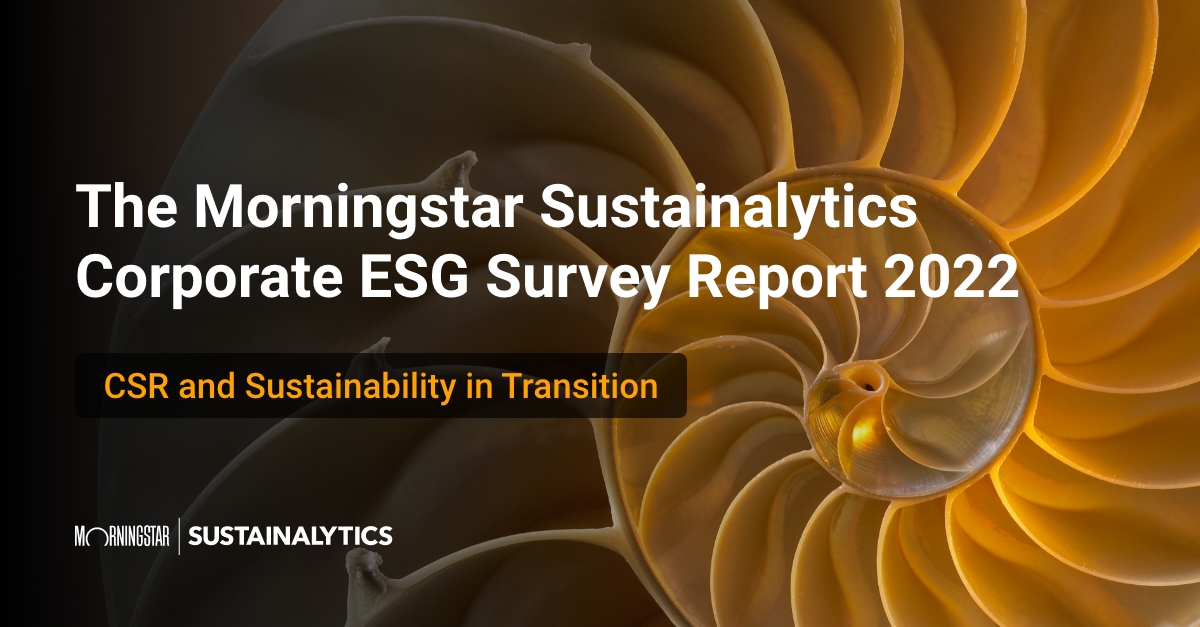As ESG risk is becoming a central issue for corporations, CSR and sustainability professionals at all levels are taking on greater responsibility for ESG activities, from strategy to practice. To manage these increased responsibilities, those driving change in this field need to understand how ESG practice is evolving, how peers are addressing ESG risks, what resources are available, and what to do about reporting, among other issues.
Earlier this year, we surveyed over 500 professionals working in CSR and sustainability to understand how their roles are evolving, what’s motivating their companies to address ESG risks, the key ESG challenges they’re facing, what resources peers are using to meet their challenges, and much more.
In this post, we highlight seven key findings from The Morningstar Sustainalytics Corporate ESG Survey Report 2022. For all the details, download the report here.
Insight One: CSR and Sustainability Teams are Managing More Corporate ESG Activities
CSR and sustainability professionals, from individual contributors to executives, are overseeing a lot of ESG activities and programs. The survey found almost nine in ten (89%) manage half or more of the corporate ESG activities at their companies.
Survey respondents are especially involved in reporting and disclosure (95% very or regularly involved), target setting and measurement (95%), program planning (94%), and ESG ratings (90%). They spend the least amount of time on supply chain management (76%) and financing (60% very or regularly involved).
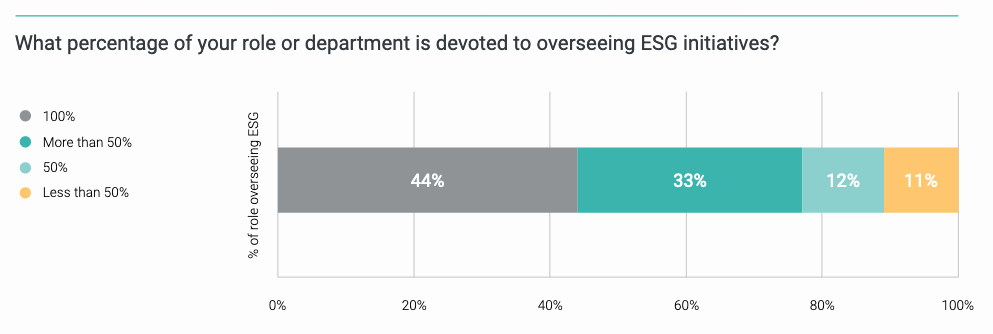
Insight Two: Defining Goals and Setting KPIs Are Slowing Companies’ Progress On Adopting a Strategic Approach to Corporate ESG
The majority of survey respondents (64%) reported that their firms have a documented corporate ESG strategy. Another 26% are in the process of developing their strategy.
The results give insight into how corporate ESG strategies advance and the challenges involved. At the first stage, 78% of respondents say they have identified the ESG issues that are most important to their corporate strategy. But at the second stage, only 61% have set specific goals and/or KPIs related to their company’s strategic ESG issues. It appears companies are having the most difficulty at the stage of identifying and adopting goals and KPIs.
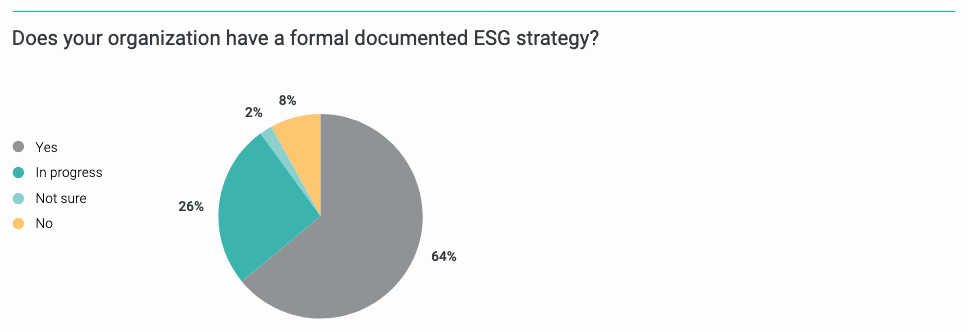
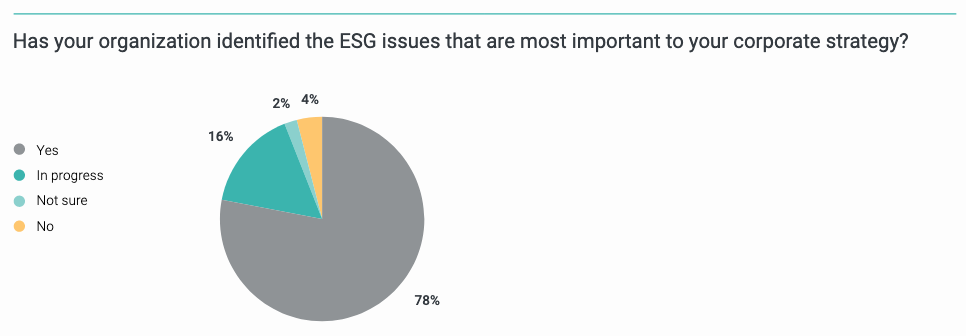
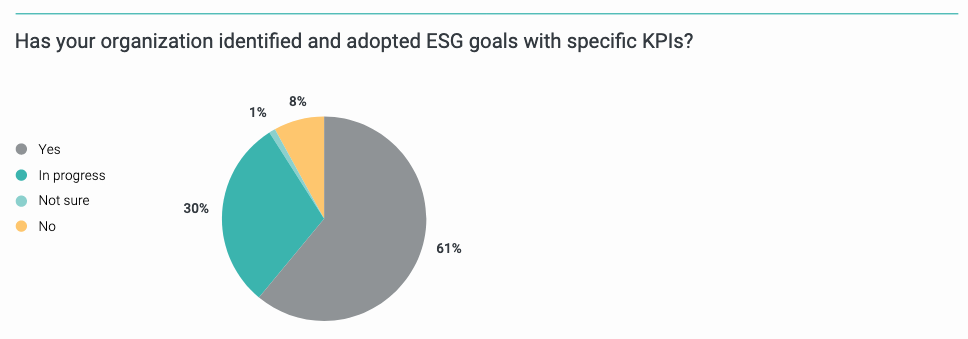
Insight Three: CSR and Sustainability Professionals Face Structural, Technical, and Cultural Challenges in Building Effective Corporate ESG Programs
Companies experience challenges at all stages of their corporate ESG journeys, including important structural, technical, and cultural issues. According to our survey, the challenges with the biggest impact on CSR and sustainability professionals include budget constraints (35% say it has severe impact); lack of human resources (34%); the measurement, reporting and disclosure of outcomes (33%); goal and target setting (32%); and meeting regulations/standards (28%).
These top challenges all relate to key steps required to build an effective corporate ESG program. This suggests that respondents are working through expected issues, but they may need additional support.
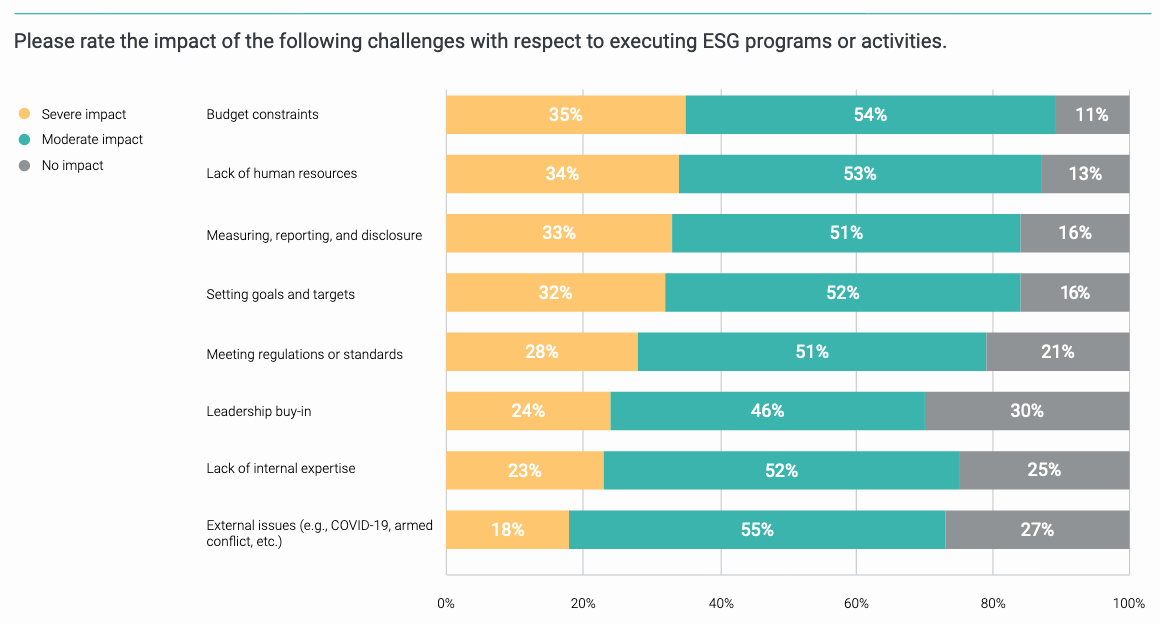
Insight Four: Consultants Are in Demand for Support Addressing ESG Challenges
The most common resources CSR and sustainability professionals use to meet corporate ESG challenges are external consultants (61%); external ESG standards and/or guidance (58%) such as the Global Reporting Initiative or Task Force on Climate-related Financial Disclosures; and internal hires (46%). Less than one in five (17%) reported the use of sustainable financing to meet their ESG challenges.
When viewed alongside other survey data, this suggests that sustainable finance is handled by other departments and respondents are more focused on the practical details of corporate ESG: understanding their material ESG issues, setting goals and targets, measurement and reporting, planning and executing, likely with help from consultants or third-party service providers.
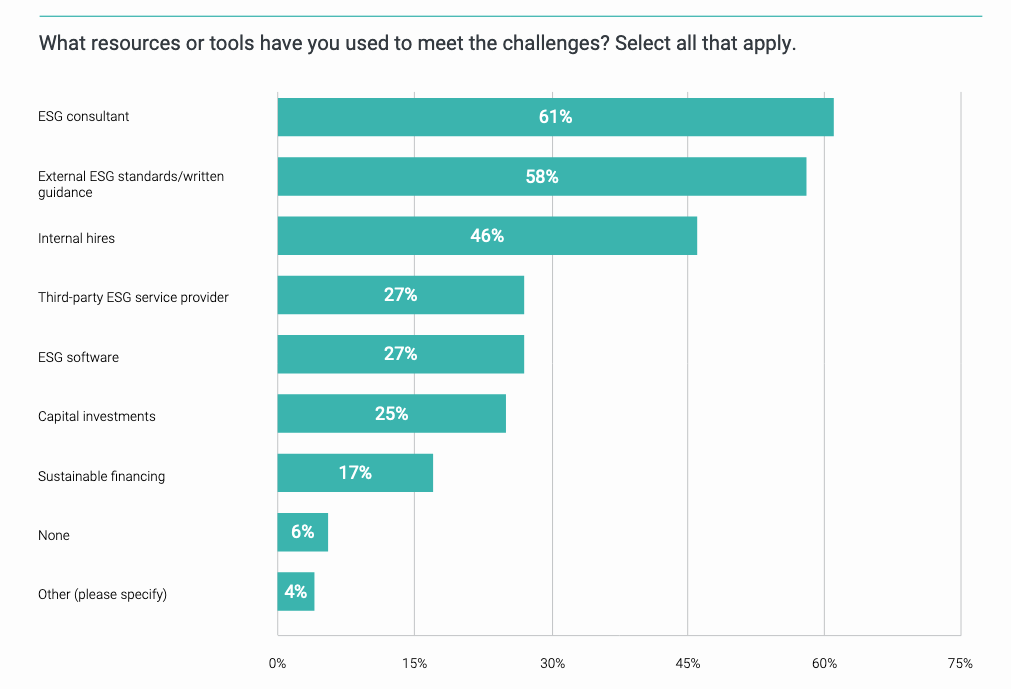
Insight Five: Environment Is the Top ESG Priority for Sustainability and CSR Teams
Respondents report that environmental issues are more important than corporate governance and social issues combined. Fifty-three percent rate environment most important compared with 25% for corporate governance and 22% for social concerns.
However, when considering “most important” and “moderately important” ratings together, the numbers tell a slightly different story. Looked at this way, environmental issues remain the most important overall, but social issues come second, and governance is third. These results indicate that companies are starting to increase their attention to social issues.

Insight Six: CSR and Sustainability Teams Enlist Third-Party Support for ESG Measurement and Reporting
As firms ramp up their ESG efforts, they inevitably recognize the need to meet global, regional, or industry standards. Most companies have adopted at least one reporting framework to guide their efforts and have sought assistance with measurement and reporting from third parties.
Three in five organizations (60%) seek out external ESG consultants for support with measurement and reporting. This option is far more popular with firms than the use of ratings providers (33%), ESG software (22%), and advice from financial institutions (6%).
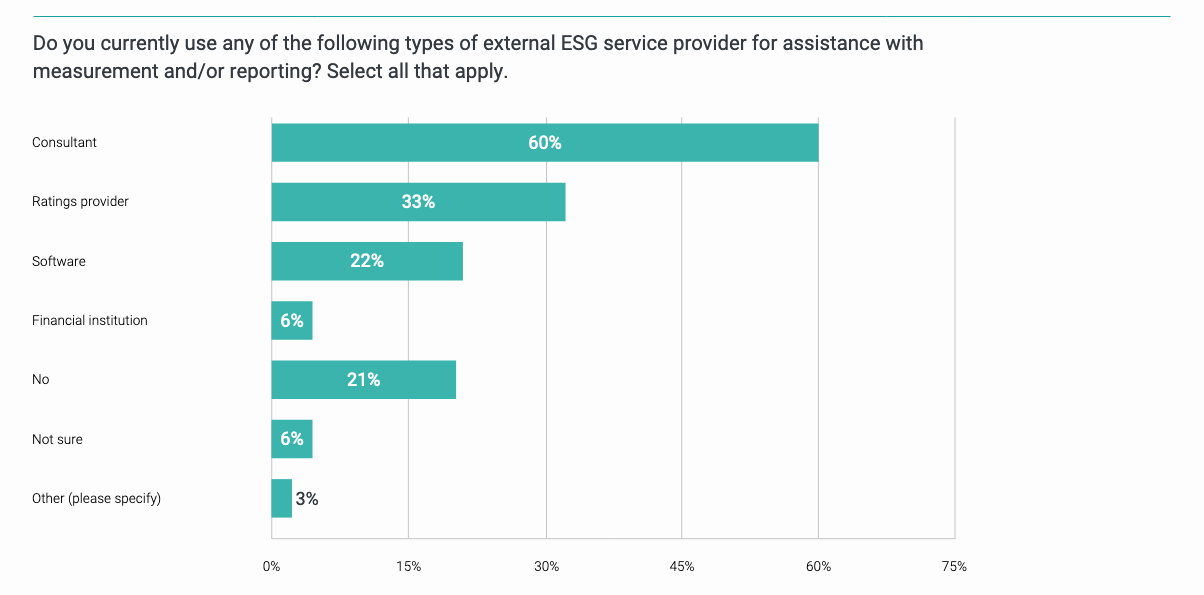
Insight Seven: More Companies Have an ESG Rating or Score – and They Are Using It
When a company obtains an ESG rating or score, it generally also receives essential data and insights from the provider. These can help companies in a variety of important ways like reporting and compliance, investor relations and PR, benchmarking, making internal improvements, obtaining financing, and understanding peer performance.
Nearly two-thirds of CSR and sustainability professionals (61%) say their company has an ESG risk rating or score. Firms are mainly using their scores for annual CSR/ESG reporting (28%) and investor relations (27%), and less so for marketing/PR (16%), annual financial reporting (9%), and sustainable finance (7%).
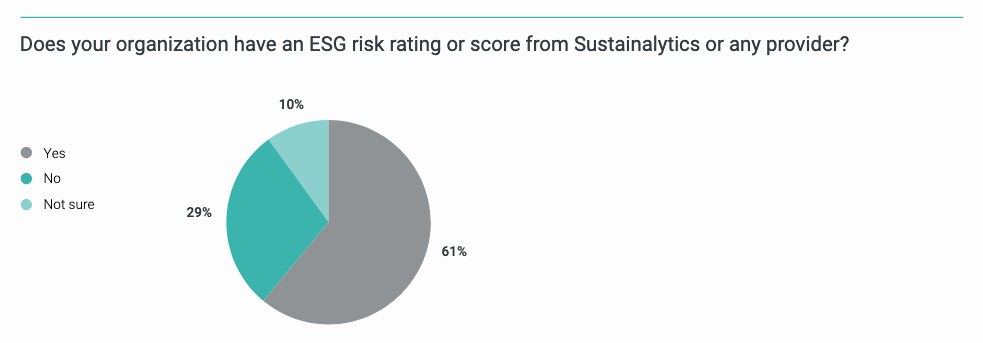
As the survey results show, the CSR and sustainability fields are in transition as practitioners at all levels adapt to the broad range of ESG-related tasks they are increasingly managing. You can find additional details on the impact of corporate ESG considerations on CSR and sustainability teams in The Morningstar Sustainalytics Corporate ESG Survey Report 2022: CSR and Sustainability in Transition. Click below to download your copy.
Recent Content
Risk and Opportunity in Biodiversity: How Sustainable Finance Can Help
This article outlines how biodiversity loss poses material risks to business and how it connects to many other issues that companies can’t ignore. In addition, it covers how biodiversity conservation presents substantial economic opportunities, and how businesses can address and access these opportunities by issuing linked instruments that integrate biodiversity considerations.
Today’s Sustainable Bond Market: Boosting Confidence in Sustainable Bond Issuances
In this article, we examine the kinds of sustainable bonds offered in the market, some of the key regulations being developed in different markets and the current initiatives to improve the quality and credibility of issuances.
Webinar Recap: How Integrating ESG Can Drive Opportunity for Private Companies
Recently, Morningstar Sustainalytics hosted a webinar – ESG in the Lifecycle of a Private Company: How Stakeholder Demands Drive Sustainability in Private Markets – to address some of the questions private companies might have surrounding ESG and how it could impact their business.

